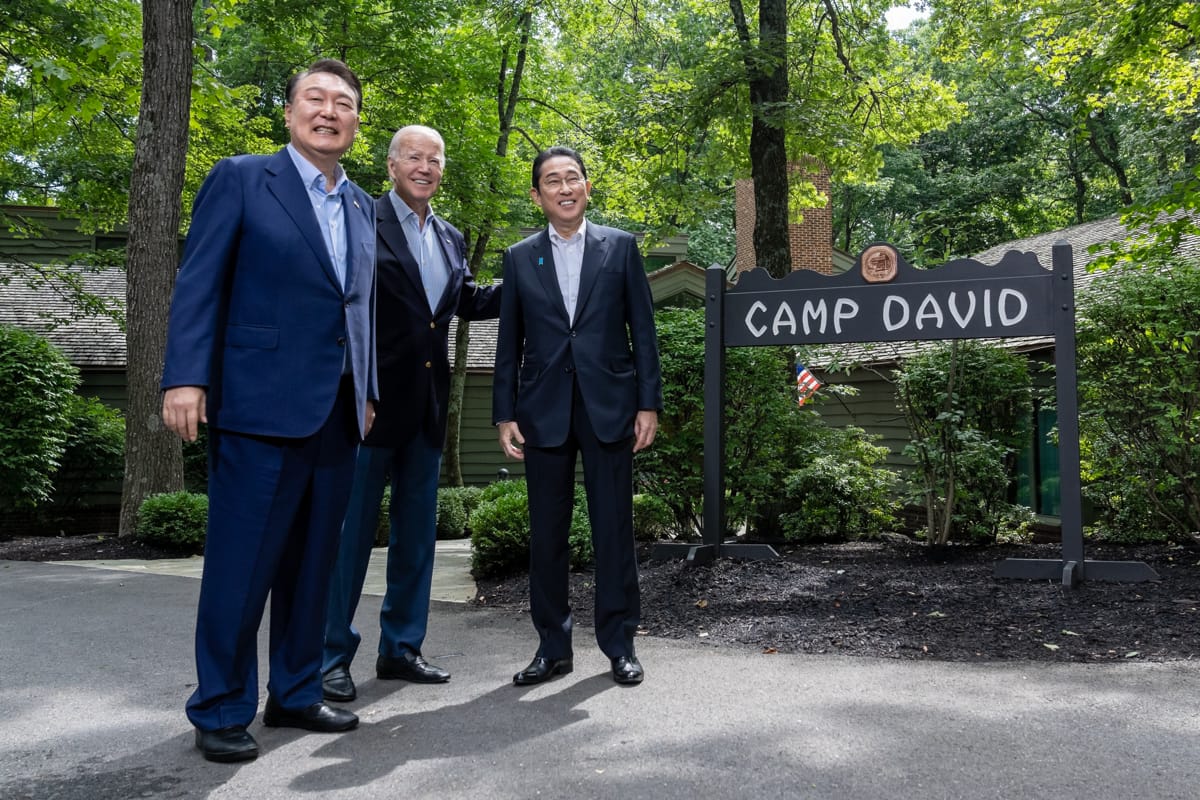In a TV interview last month, South Korean Defence Minister Shin Wonsik said he will work quickly with his Japanese and US counterparts to formalise their Trilateral Security Cooperation Framework.
Facing continuing threats from a nuclear-armed North Korea, whose renewed security pact with Russia has caused consternation, Seoul seems keen to operationalise this trilateral defence framework prior to the US election and change of US president.
The history of fractured attempts by Seoul and Tokyo to repair and advance their relationship does not generate optimism. But the third partner in this framework, the United States, is probably the only country now capable of coaxing lasting cooperation – if not yet close fraternity – between them. At least under the current US administration.
As the world focuses on a possible second term for Donald Trump, not forgotten are the striking televised images of Trump’s meetings with North Korean leader Kim Jong-un in Singapore and Hanoi, as well as on the line of the DMZ dividing North and South Korea in 2019.
There are few more pressing issues for Australia’s interests than ensuring the two Western-aligned, highly capable northeast Asian countries can move forward in this way with the United States.
Trump also speculated that Kim “misses me” during his acceptance speech at the recent Republican National Convention. What to make of such a throw-away line? Without reading too much into campaign hyperbole, the hope is that Trump is or will be advised more expertly on the downsides of courting a world despot – of the Kim regime’s illegal activities, weapons proliferation and demonstrated ability to mount cyberattacks on US businesses. And the fact that his meetings with Kim had little effect on North Korean activities – including those antithetical to US interests.
Meanwhile, the stars are aligning in Seoul and Tokyo for Shin’s hope to be realised. If so, the Trilateral Security Cooperation Framework will be a critically important step. It will not yet be a NATO-style formal mutual defence treaty. But it will be a powerful political signal, and one which at its core represents strategic reconciliation between South Korea and Japan.

There are few more pressing issues for Australia’s interests than ensuring the two Western-aligned, highly capable northeast Asian countries can move forward in this way with the United States.
What is in the framework?
Resting on the three partners’ respective Indo-Pacific strategies, the framework points to the immediate threats posed by China’s military expansion, notably in the South China Sea, to the Taiwan situation, and to North Korea’s dangerous missile tests, hundreds of which have splashed down in the Sea of Japan.
The framework outlines an ambitious work program of three-way policy consultations, information sharing, trilateral exercises and defence exchanges.
Shin and his counterparts, Japanese Defence Minister Kihara Minoru and US Secretary of Defence Lloyd Austin have moved quickly in the past year to lock down this framework and bring it to life.
The first iteration of a new, multi-domain trilateral exercise, “Freedom Edge”, occurred in June. And a data sharing mechanism to exchange real-time missile warning data to detect and assess ballistic missiles launched by North Korea, already activated, will be “optimised” by the end of this year “to ensure the ability to deter” is effective.
Since the 1980s, Australia has been active in building the Indo-Pacific architecture – of ASEAN-centred forums such as APEC and the East Asia Summit, regional trade groupings, and smaller minilaterals and trilaterals that have cemented relations with and among Australia's closest partners including the United States, Japan and South Korea. The emerging Japan, Korea, US Trilateral Security Cooperation Framework does not involve Australia directly. But it is one of the most consequential developments for Australia’s aims.
Should the framework survive the vicissitudes of domestic politics in all three countries, let’s hope it evolves into a lasting pact that combines whole-of-government efforts together – diplomatic, information and economic, in addition to military – under the clear endorsement of the three leaders.
One capable of offsetting the pacts emerging among the members of a new “axis of evil”.

